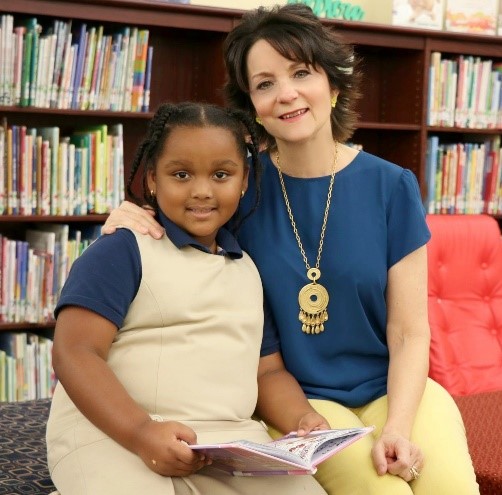by Jacque Daughtry
The beginning of not only a new year but a new decade causes us to reflect on how we arrived where we are today. As I look back at my last 13+ years as Executive Director, I am amazed and humbled at the organization we have built. When Jerry Davis, my son’s Westside High School lacrosse coach, called me to share his vision for starting a non-profit and asked me to help him, neither of us ever dreamed the organization would be all it is today.
Jerry saw a need, and I jumped on board and off we went . . . no money, no plan but with a burning desire to ensure that kids would not fall through the cracks – emotionally, socially, or academically. We knocked on doors, leveraged relationships with HISD administrators we’d developed over the years, wrote grant applications, and enlisted the help of our friends and families – we were very determined! About half the members of my Bible study group were the volunteers in our first after school program at Walnut Bend Elementary. I get teary-eyed and smile thinking about those first few years – our dogged determination, our scrappiness, our never say never attitudes.
In the first two years, we offered math and reading tutorials but quickly decided to focus only on reading as the building block for success in academics and life. The literacy crisis had not been named or discussed much in our city at the time, but we saw it every day on the frontlines while working with struggling students. Classroom teachers were and are working incredibly hard each day to close achievement gaps and meet the tremendous and varying needs of their students. It’s a very heavy lift and not one that can be done alone.
Since its founding in 2006, Making It Better (Literacy Now) has been addressing the needs of the whole child so that all have the opportunities needed to reach their full potential. Our program curriculum is evidence-based and delivered by highly qualified staff, but our secret sauce has been and always will be building relationships with those we serve . . . the children, their families, school personnel, donors, volunteers, and corporate and program partners. A lot has changed in our programming and operations, but two things have and will always remain the same – our focus on building relationships and putting the kids first.
Two pivotal things happened in 2014. First, we were chosen to take part in the Rice University Capstone Program, which helped us do a deep dive into our program offerings, our operational practices, and fundraising activities. At the end of that five-month intensive process, we had streamlined processes and honed in on our most important program focus and what we did best – developing literacy skills in young children and engaging families in that process. Second, I was proud to be included with 100+ leaders in the literacy arena who participated in a lengthy collaborative process spearheaded by the Barbara Bush Houston Literacy Foundation to create Houston’s Literacy Crisis: A Blueprint for Community Action. With organizations coming together around this problem in our city and the release of the report in April 2014, the literacy crisis in Houston was brought out from behind the scenes and into the public. The statistics brought to light in the Blueprint were astonishing – the following are just a few. Everything we felt in our gut had been proven with research – focusing on young, struggling readers was what we needed to do!
- 60% of Houston-area kindergartners entered school without the requisite reading-readiness skills
- 1 book is available for every 300 children in low-income area homes.
- 1 in 4 Houston 3rd graders failed to meet the minimum academic performance level on the state reading assessment.
- Children who do not read proficiently by the end of third grade are four times more likely not to graduate from high school.
- 85% of all juveniles who interface with the juvenile court system are functionally illiterate.
- 73% of the nearly half-million school-aged children in Houston are considered economically disadvantaged.
- Children who live in poverty have heard over 30,000,000 fewer words than their more affluent peers by age 3.
Now, fast forward almost six years – these are just a few things that are being done to address these specific problems.
- To address Kindergarten readiness
- In 2019, the Texas state legislature funded full-day pre-k for low-income and other qualified students.
- In 2018, we launched The Reading Express – a mobile classroom visiting low-income communities each week. The sole purpose of this free program is to provide access to high-quality reading readiness programming and to equip caregivers of children ages 2 months to 4 years with skills and materials to incorporate reading-readiness activities into daily routines.
- To build home libraries
- Since the release of the Blueprint, organizations including Barbara Bush Houston Literacy Foundation, Books Between Kids, Legacy Community Health, and many more are distributing tens of thousands of new and gently used books to children who need them most.
- Since that 2014 Blueprint release, we have distributed 20,000+ books to the children and families we serve.
- To address 3rd grade reading scores and improve learning outcomes
- Early Matters was launched in late 2014 out of the Greater Houston Partnership and brought the business, education, philanthropic, and medical communities together around the goal of all Houston area 3rd graders reading on grade level by 2025. Early Matters served as the springboard for the January 2018 creation of Good Reason Houston with a focus on decreasing the number of Houston area public schools with ratings below a “B”.
- We are serving 504 HISD K-2nd grade struggling readers through our Reading Intervention program, which is closing gaps between their reading level and their grade level. The ultimate goal is that our students will be reading on grade level when they enter 3rd grade.
In just nine weeks, many of our struggling students go from being non-readers to readers (see for yourself), and all others make great strides as well.
Despite all the work that has been taking place, more and more children who struggle to read enter our public schools every day. There is still so much to be done to ensure that ALL Houston area public school students are reading on or above grade level by 3rd grade.
To help address the continuing need, we have a very ambitious expansion plan: serving 700 students in 2020-21, 950 students in 2021-22, and 2,000 students by 2024-25.
Yes, our expansion plans are bold and daunting, but we must be bold to ensure that every child has the opportunity to reach his/her fullest potential! So, what can YOU do to help?
- Read to a child: your own every day, your neighbor’s, your grandchildren, at a nearby school or community center.
- Educate yourself about this issue and help us educate others in your sphere of influence – follow and share our monthly blog.
- Organize a book drive and donate books to us or other organizations such as Books Between Kids who distribute books to those children most in need.
- Join us by becoming a volunteer or a donor.
We have come a very long way, and friends and family members still volunteer, but we now have 40 employees and 250+ volunteers, along with a 3-year strategic plan and a substantial budget. As the saying goes, We’ve come a long way, baby! What an adventure!

